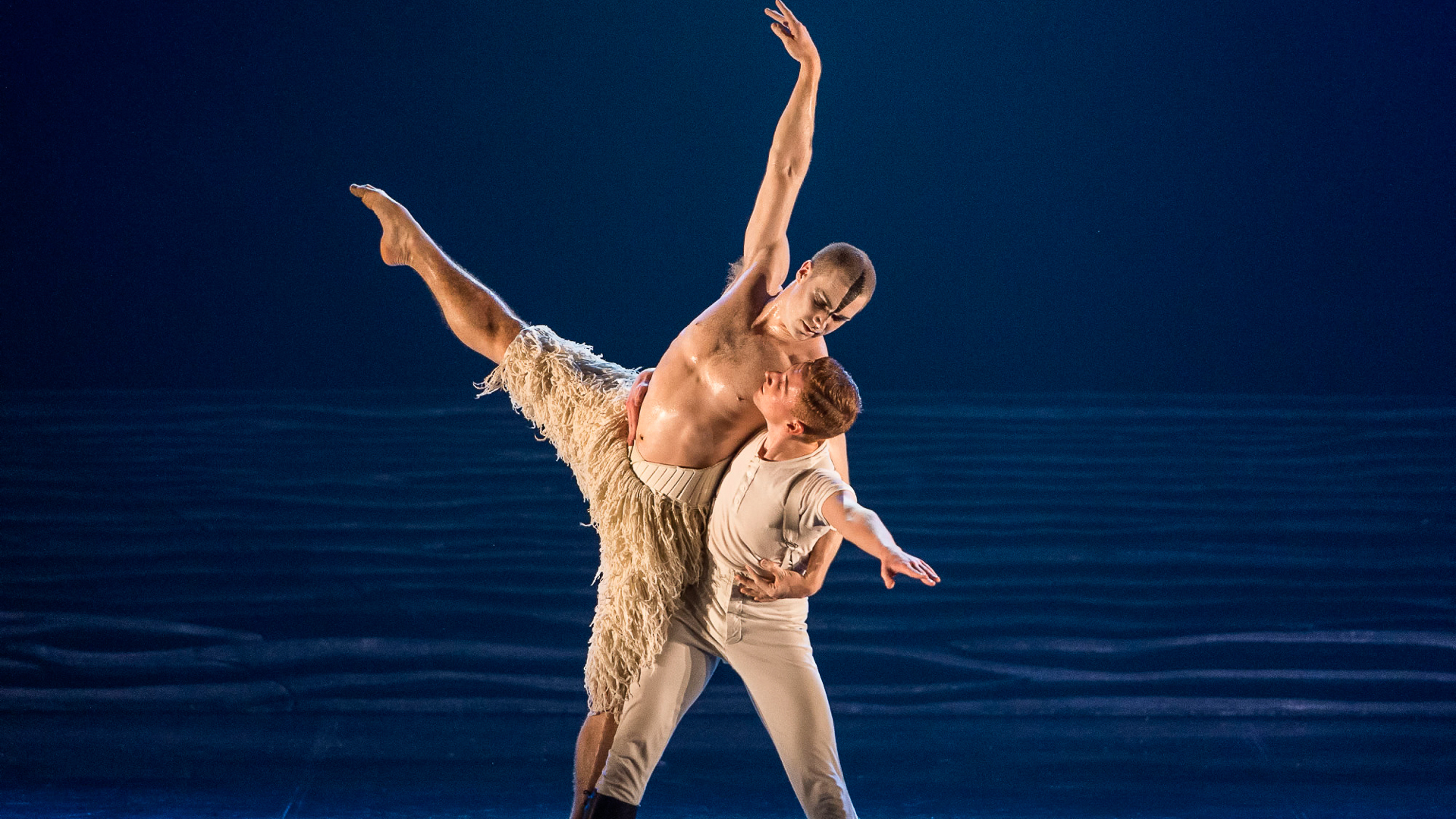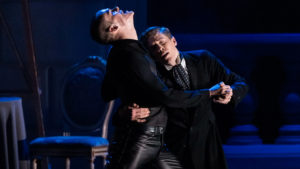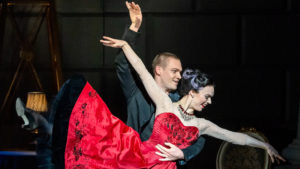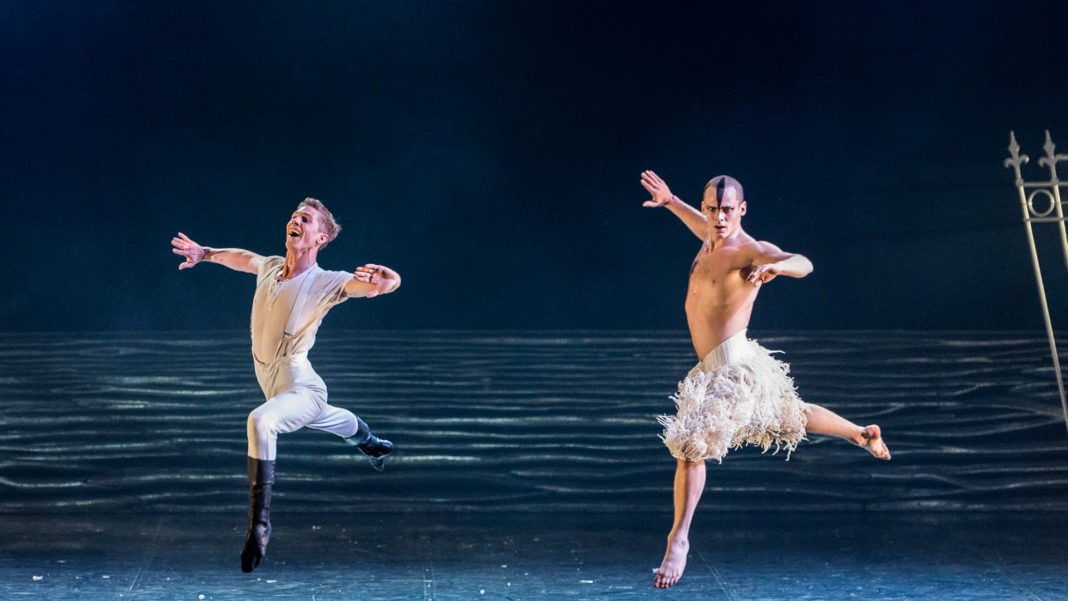Depending on which performance of Matthew Bourne’s Swan Lake you attend, you will either see Will Bozier or Max Westwell in the dual roles of The Swan and The Stranger. If you talk to either dancer, they will each tell you that if you were to see back-to-back shows with each of them dancing the roles, you’d see different shows. I wanted to find out more about each of them and what would make the performances so different. In part one of my interview with the two men, we’ll look at how they each approach the dual roles and the challenges of dancing them.
I spoke to each dancer separately by phone. I spoke to Max while Will had a rehearsal. Five minutes after hanging up I was talking to Will while Max had a rehearsal. These are edited excerpts from both conversations.

Not only is the part of The Swan/The Stranger double cast, but so is the role of The Prince (James Lovell or Andrew Monaghan). Is there a difference when you are paired with one dancer versus another?
WB: It is very different because you have two amazing guys who are different in ages, height, in pretty much everything. It’s refreshing to do this with both dancers. Every show is different and they bring different stuff to the role.
MW: This is actually what makes it really enjoyable and allows us to do it so many times. It depends on my mood and their mood and you have to really watch and be present and respond to what’s happening in the moment. It’s a great way to make each show organic and authentic. It’s a bit of a gift.

Which part is most like you of the two and what are the challenges of creating a distinct different between The Swan and The Stranger, but still allow for a discernible link between the two?
WB: I think I’m more like The Stranger as he’s confident with himself and his abilities. I think the swan stuff is the hardest because you are playing The Swan and to put that across is quite a hard thing.
MW: Oooh, I would say there are parts of me in both of them. You have to draw on your own experiences. As a person I’m high energy and personable. The Swan is beautiful and ethereal, which is not very much like me. I would say The Stranger but with less malice.

How do you approach the two roles?
WB: I’m trying to thing of examples. It’s very different. You react off how [the other dancers] they act. Acting is reacting we always get told. It’s different for me.
MW: I would say lines-wise I make slightly different shapes. I would say I’m more fluid in The Swan. My Stranger is coming from a different place. I’m more provocative and he’s more aggressive. It’s more to do with intention and how we do the movement.
Are there more similarities or differences in how you each dance the part?
WB: Me and Max are very different performers. I’m more from musical theatre and he’s more about ballet. We do bring something different to it and it’s great to watch what Max does. It helps me build my swan.
MW: Over time it has evolved that we both do The Swan and The Stranger very differently now. It’s almost like two separate shows. It’s a specialized performance. We have every single aspect down for our particular versions.
How long did it take your bodies to get used to moving your necks and heads like a swan might?
WB: To be honest it took a good three months to feel good and to make sure we were showing that we were a swan. It’s quite delicate and subtle. Your neck gets used to it, but it took a good three months to get it in my body.
MW: We did a lot of research and I looked at previous people doing it. It feels hugely unnatural. I felt severely strained in my neck and I had to get a lot of help. It took a lot of time to embody the swan, but it took a good couple weeks in rehearsal to really understand the movement.
What did you learn about yourself as a dancer over the time you’ve been dancing the parts?
WB: I think this role has definitely made me physically stronger, mentally stronger. It made me realize how many different characters you can do within the show and show the difference between the two. It’s made me mature as a person and grow up. It’s a big responsibility to have this role.
MW: That I love to express. I kind of knew it before – I’ve played other animals. To express a swan is hugely rewarding. I love contemporary movement to express story. It has no limitations at all. It’s a very freeing way of expressing story.
Will, you said in a promotional video for Swan Lake that your interpretation is that the Swan is part of The Prince’s imagination and what he wishes he could be without being able to do so. What, then, is your interpretation of The Stranger and his relationship to The Prince?
WB: I think The Stranger is a real person and what the Prince sees in The Stranger is what he sees in The Swan. The Stranger is rugged and free and can do and say what he wants. That’s the representation of The Stranger in the eyes of The Prince.
Max, you spent five years trying to join this company (New Adventures). Now that you have accomplished your goal, how has the experience been?
MW: I’ve absolutely loved it. It’s been a big development for me physically and movement-wise. I’m used to doing ballet class every day and doing contemporary dance every other day. It has broadened my mind to all sorts of way of moving. The company has been amazingly welcoming.
We continue our interviews with Will Bozier and Max Westwell here. We’ll talk about their intermission routines changing from The Swan to The Stranger, the influence Adam Cooper (who originated these roles) has had on their careers and this production and whether or not this once controversial approach to Swan Lake is still controversial.
Main Photo: Andrew Monaghan and Will Bozier in Swan Lake (Photo by Craig Schwartz/All photos courtesy of Center Theatre Group)











